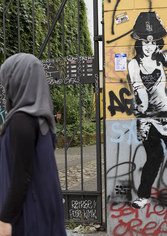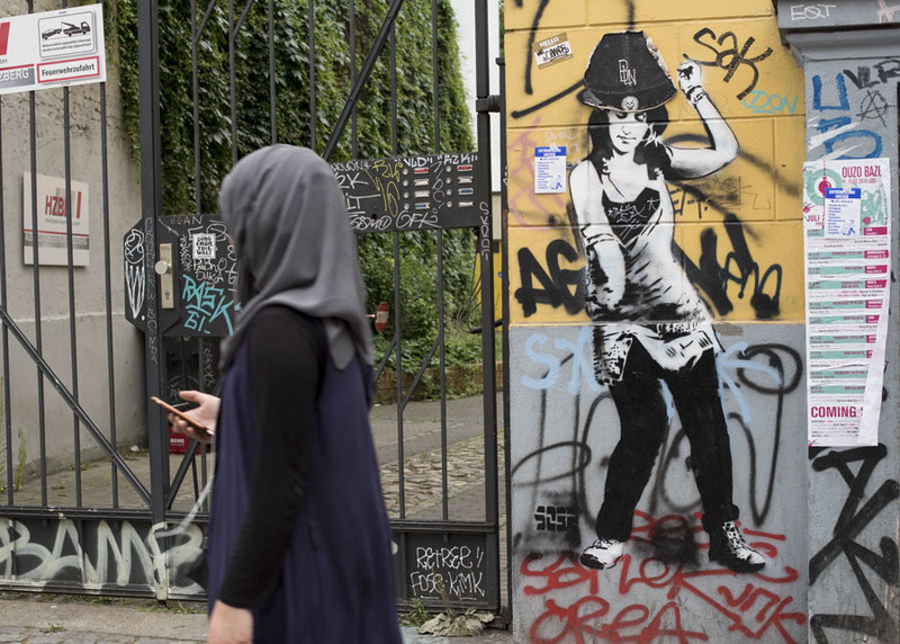Conferences and debates
Index / Activities / Conferences and debates / Conference series: “What Do Muslim Youths Say?”
Conference series: “What Do Muslim Youths Say?”
Casa Árabe has organized this series of seven conferences in conjunction
with the Junta Islámica and the Pluralism and Co-existence Foundation.
Islam is a reality with an ever growing presence in our society. Though the figures vary depending on sources, it is estimated that Muslims amount to somewhere between 3% and 4% of the population residing in Spain (2.6% according to data from 2015 by the PEW Research Center, or in other words, 1.18 million Muslims, or 4.2% according to year 2018 data from the Observatorio Andalusí, which increases the figure to nearly two million).
Spain’s Muslim community is made up of people who come from many cultures and nationalities, with different life experiences. They interpret their religion in a wide range of ways. Despite this reality, however, Muslim people are often perceived as followers of a monolithic, unchangeable, threatening form of Islam.
Through this series of dialogues, debate and exchanges coordinated by Antonio de Diego and Nessrin El Hachlaf, Casa Árabe, the Junta Islámica and the Pluralism and Co-existence Foundation are offering a forum which provides the opportunity to become familiar with and understand Muslim diversity throughout seven different themed days, when we will discuss topics relevant to the Muslim community in general and to females youths and women in particular.
The sessions will discuss the following topics:
(1) Identities and stereotypes: where are Spanish Muslim youths, what are they doing and what do they think? (January 27)
(2) The Muslim family: challenges to overcome in the twenty-first century (February 19);
(3) Beyond the patriarchy: gender, taboos and changes in communities (March 11);
(4) Beyond daily life: Ecology, responsible consumerism, foods and free time (April 1);
(5) The sunna of labor: Islam, entrepreneurship and employment) April 22);
(6) How do Spanish Muslims celebrate Ramadan? (May 13);
(7) Models for the transmission of knowledge and Islamic authority in the 21st century (June 3).
Spain’s Muslim community is made up of people who come from many cultures and nationalities, with different life experiences. They interpret their religion in a wide range of ways. Despite this reality, however, Muslim people are often perceived as followers of a monolithic, unchangeable, threatening form of Islam.
Through this series of dialogues, debate and exchanges coordinated by Antonio de Diego and Nessrin El Hachlaf, Casa Árabe, the Junta Islámica and the Pluralism and Co-existence Foundation are offering a forum which provides the opportunity to become familiar with and understand Muslim diversity throughout seven different themed days, when we will discuss topics relevant to the Muslim community in general and to females youths and women in particular.
The institutional opening event for the series will take place on Monday, January 27, with the participation of Pedro Martínez-Avial, the General Director of Casa Árabe; Inés Mazarrasa Steinkuhler, director of the Pluralism and Co-existence Foundation; Isabel Romero, president of the Junta Islámica, and Riay Tatary, president of the Islamic Commission of Spain, as well as the event’s coordinators.
(1) Identities and stereotypes: where are Spanish Muslim youths, what are they doing and what do they think? (January 27)
(2) The Muslim family: challenges to overcome in the twenty-first century (February 19);
(3) Beyond the patriarchy: gender, taboos and changes in communities (March 11);
(4) Beyond daily life: Ecology, responsible consumerism, foods and free time (April 1);
(5) The sunna of labor: Islam, entrepreneurship and employment) April 22);
(6) How do Spanish Muslims celebrate Ramadan? (May 13);
(7) Models for the transmission of knowledge and Islamic authority in the 21st century (June 3).
-

Identities and stereotypes: where are Spanish Muslim youths, what are they doing and what do they think?
January 27, 20207:00 p.m.MADRIDCasa Árabe Auditorium (at Calle Alcalá, 62). 7:00 p.m. Free entry until the event’s capacity is reached.In Spanish.On Monday, January 27, we will be holding the opening session of the conference series “What Do Muslim Youths Say?” organized by the Junta Islámica, Casa Árabe and the Pluralism and Co-existence Foundation.It will include the participation of Mayda Daud Abdelkader and Ismaín Perera, and will be moderated by Inés Mazarrasa Steinkuhler, director of the Pluralism and Co-existence Foundation.
The goal of this conference is to explore the creation of multiple identities in Spanish Islam and critically examine stereotypes and behavioral models perceived by youths in their everyday lives and different arenas within society.
Before the talk, there will be an official institutional opening event for the conference series, with the participation of Pedro Martínez-Avial, General Director of Casa Árabe; Inés Mazarrasa Steinkuhler, director of the Pluralism and Co-existence Foundation; Isabel Romero, president of the Junta Islámica, and Riay Tatary, president of the Islamic Commission of Spain, as well as the event’s coordinators: Antonio de Diego, Vice-President of the Junta Islámica and a professor of Political Philosophy at the University of Jaén, and Nessrin El Hachlaf, a lawyer and journalist.
-
The Muslim Family: Challenges to overcome in the twenty-first century
February 19, 20207:00 p.m.MADRIDCasa Árabe Auditorium (at Calle Alcalá, 62). 7:00 p.m. Free entry until the event’s capacity is reached.In Spanish.Rafa Millán and Miriam Hatibi are taking part in the second session of our conference series titled “What Do Muslim Youths Say?” organized by the Junta Islámica, Casa Árabe and the Pluralism and Co-existence Foundation. It will be taking place on Wednesday, February 19, 2020.This second session of the conference series “What Do Muslim Youths Say?,” organized by the Junta Islámica, Casa Árabe and the Pluralism and Co-existence Foundation, will be exploring the challenges and hurdles which can be found in different models of Muslim families in the modern day. An emphasis will be placed on aspects such as the way in which family relations, upbringing and parenthood are dealt with, as well as other matters involving the lives of youths and teens within the context of Muslim, inter-religious and inter-ethnic families.
In order to discuss these topics, we will be relying on the participation on Rafa Shihabuddin Millán, a psychologist, philosopher and writer, and Miriam Hatibi, a communication consultant and activist from Catalonia, who will be undertaking a dialogue directed by Antonio de Diego, the Vice-President of the Junta Islámica and a professor of Political Philosophy at the University of Jaén, as well as being the coordinator of this event series along with Nessrin El Hachlaf.
Conference information sheet
Rafa Millán has a bachelor’s degree in Psychology from the Universidad Autónoma de Madrid and a Master’s degree in Philosophy from the Universidad Complutense de Madrid. In 2005, he became familiar with Sufism, and his life changed radically. He has had numerous articles published in academic books and journals, as well as organizing and taking part in congresses at several universities. His most notable books include Las enfermedades mentales no existen, son los padres (Mental Illnesses Do Not Exist, It’s the Parents, published by Manuscritos in 2017) and Cómo ser sufí y no morir en el intento (How To Be a Sufi and Not Die Trying, published by Guante Blanco in 2020). He is the father of five children.
Miriam Hatibi is a communication consultant at Sibilare and a social activist. She studied International Business Economics at Pompeu Fabra University and completed a Master’s degree in Internationalization at the University of Barcelona. Since 2014, she has been the spokeswoman for the Ibn Battuta Foundation, an entity created to promote sociocultural exchanges and the dissemination of scientific knowledge between Morocco and Spain, a position through which she helps us see the richness in our differences and the value of respect. She is the author of the book Mírame a los ojos (Look Into My Eyes, published by P&J, 2018) and actively contributes to many media outlets, the most notable of which include ElDiario.es, RTVE and RAC1.
-
Beyond the Patriarchy: Gender, taboos and changes in communities
March 11, 20207:00 p.m.MADRIDCasa Árabe Auditorium (at Calle Alcalá, 62). 7:00 p.m. Free entry until the event’s capacity is reached.In Spanish.Third session in the conference series “What Do Muslim Youths Say?” organized by the Junta Islámica, Casa Árabe and the Pluralism and Co-existence Foundation. This session will deal with topics such as gender roles, stereotypes about masculinity and femininity, and gender-related violence.This third session seeks to create an open dialogue about the taboos and changes which occur within Muslim communities with regard to gender and sexuality. To this end, the round table discussion will deal with topics such as gender roles, stereotypes about masculinity and femininity, and gender-related violence.
To discuss these subjects, we will be relying on the participation of Ana Silva, a legal expert and specialist on Islamic feminism, Souad el Hadri, an author and lawyer at the firm Efica Abogados, and Marta Mardía, a writer and high school teacher, in a conversation moderated by Nessrin El Hachlaf, a lawyer, journalist and coordinator of this event series with Antonio de Diego.
Ana Silva Cuesta has a PhD in Law from the University of Granada, after completing a doctoral thesis on female genital mutilation, a topic which she has been researching for years. She also researches and works with different social groups on topics involving migration, gender and women’s rights in Islam. She authored Cuerpo Adentro (Inside the Body), her first book of poetry, as well as many academic articles. She is also a member of the editorial board and assistant director of the Andalusian cultural journal Secreto Olivo.
Souad el Hadri is a lawyer and founding partner at the Efica Abogados law firm. She completed her PhD in Law, after finishing her thesis on “Women’s rights in Islam and their personal status in the Maghreb region” (University of Valencia, 2008), and a bachelor’s degree in Law from the University of Oujda. She also possesses a Master’s degree in Social and Intercultural Mediation, a post-graduate course (from the University Institute of Women’s Studies, 1996) and accreditation as an intercultural mediator from Valencia’s Department of Social Welfare (2011). She has collaborated with many different associations and organizations in the field of mediation, legal consultation, migrations, gender, human rights, asylum and immigration law, as well as courses and academic coordination (including the University of Valencia’s Mediterranean South-North Board and Institute of Human Rights Chair, the “Taula Cívica” of the Southern Mediterranean, etc.). Her most notable publications include the book Derechos de la mujer en el islam y su estatuto personal en el Magreb (Women’s Rights in Islam and Their Personal Status in the Maghreb Region, published by Tirant Lo Blanch, 2010), and an article titled “La place de la Femme dans le Projet de l’Union Pour la Méditerranée” (“Women’s Place in the Planned Union for the Mediterranean”) with Aicha Abounai, which appears in Musulmanas y derecho a la cultura. Tradición y modernidad (Muslim Women and the Right to Culture: Tradition and modernity, published by La Xara, 2011). She is the Vice-Secretary General of the International Association of Lawyers of Moroccan Origin.
Mardía Herrero, a writer and high school teacher, Herrero holds a PhD in Literature and a Master’s degree in the Science of Religions, as well as a bachelor’s degree in History and Hispanic Philology. She has had a book published with the title 39 semanas y media. Un embarazo sufí (39 and a Half Weeks: A Sufi pregnancy, Mandala, 2016), as well as El paraíso de los escritores ebrios(The Paradise of Inebriated Writers, Amargord, 2007), in addition to writing articles for the journal put out by the Cervantes Institute, Rinconete. She has a YouTube channel with her husband Rafa Millán, and together they post weekly videos on spirituality, psychology, Sufism and education, as well as giving conferences and attending events about these topics, Christian mysticism, theories of the imaginary and sacred motherhood.



